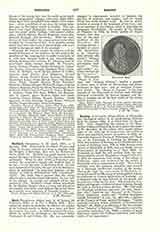

Reding, AUGUSTINE, Prince-Abbot of Einsiedeln and theological writer, b. at Lichtensteig, Switzerland, August 10, 1625; d. at Einsiedeln, March 13, 1692. After completing the classics at the Benedictine College of Einsiedeln he there joined the Order of St. Benedict, December 26, 1641, taught philosophy at the early age of twenty-four, was ordained priest and appointed master of novices in 1649, obtained the degrees of Doctor of Philosophy and Theology at the University of Freiburg im Breisgau in 1654, was professor of theology at the Benedictine University of Salzburg from 1654 to 1648, became dean (prior) at Einsiedeln in 1658, and was finally elected Prince-Abbot of Einsiedeln on July 17, 1670. At Einsiedeln he built the still existing choir, the confession-church, and St. Magdalene’s chapel (1674-84). In 1675 his monastery took charge of the college at Bellinzona, which was conducted by the monks of Einsiedeln until its suppression in 1852. He watched carefully over the monastic discipline and insisted on a thorough intellectual training of his monks. During his time the conventuals of Einsiedeln increased from 53 to 100, many of whom gained renown as professors at various institutions of learning. As a, temporal ruler he was beloved by his people and revered as a father by the poor. His numerous theological writings give evidence of great learning, though his style is dry and at times obscure. His chief work is “Theologia scholastica universa” (13 vols. Einsiedeln, 1687), based on the “Summa” of St. Thomas. Other important works are: “Veritas inextincta concilii Tridentini” (5 vols., ib., 1677-84), a defense of the Council of Trent against Heidegger; “Vindex veritatis centuries prima annalium ecclesiasticorum Baronii” (ib., 1680), a justification of the first century of the “Annales” of Baronius; “Oecumenicae cathedrae apostolicae authoritas” (ib., 1669), a defense of papal supremacy against the Gallican Liberties; and other works of less importance.
MICHAEL OTT

